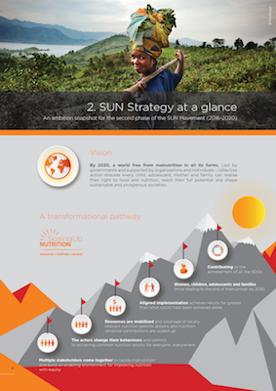SUN Movement update
September 21 2016 at the UNICEF Headquarters in New York was a significant day for the SUN Movement with the inauguration of its new Lead Group – comprising 29 nutrition champions from around the world, including current and former heads of state, public and private sector leaders and social change-makers – and the launch of its new Strategy and Roadmap for 2016-2020, a practical vision of how working together can put an end to malnutrition.
The Lead Group members have pledged to place nutrition at the top of the global agenda, and the event provided a platform for them to voice their commitments to eliminate malnutrition in all its forms, everywhere.
“After joining the SUN Movement, I took nutrition very seriously and made it a legacy of my presidency. Moving forward, I will champion good nutrition and its importance for children’s education and futures.”– Jakaya Kikwete, Former President of the United Republic of Tanzania and Lead Group Member
SUN Roadmap
The new Strategy and Roadmap retains its primary focus on the critical 1,000-day window of opportunity from pregnancy to second birthday. However, it acknowledges and responds to the fact that every country has a malnutrition problem. It capitalises on nutrition’s now global prominence as a socio-economic priority and locates the SUN Movement as an essential platform for sharing progress and challenges, and guiding a countryled, multi-sector and multi-stakeholder approach to tackling malnutrition. It recognises the SUN Movement as a model of multi-stakeholder collaboration – one that breaks down siloed ways of working– and a frontrunner for informing implementation of the Sustainable Development Goals. Most importantly, the Roadmap is based on what SUN countries have indicated they need to transform the momentum gained in the first phase of the Movement into tangible results. It outlines a practical roadmap, with ambitions to be achieved by 2020, in which every stakeholder has a role to play. Each will be accountable for results.

New SUN countries
2016 has seen Sudan, Papua New Guinea and the Indian States of Uttar Pradesh and Jharkhand join the SUN Movement. SUN countries, including Bangladesh, El Salvador, the Gambia, Lesotho, Nepal, Nigeria, Somalia and Swaziland, are demonstrating significant reductions in malnutrition, proving that it can be eradicated within our lifetime.
Forty-nine of the 57 SUN countries1 now have an active Multi-Stakeholder Platform (MSP) at the national level. Thirty-nine countries have a Civil Society Alliance; 29 are actively collaborating with private sector partners; 33 have established a United Nations Network for SUN; and 28 have appointed a donor convener to help align resources for nutrition behind national nutrition plans.
1 Reported progress from SUN countries named above have been validated by UNICEF, WHO and the World Bank Joint Malnutrition Estimates Group.

